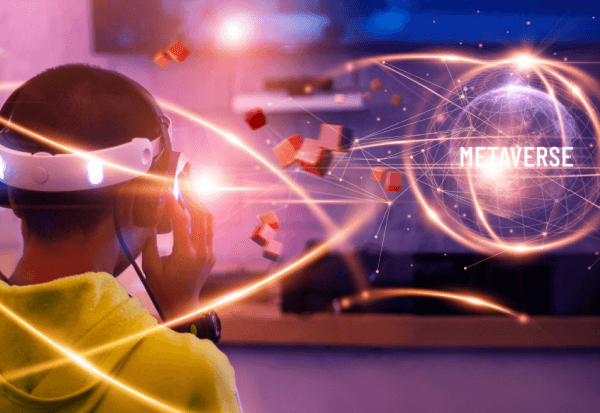The automotive industry is undergoing rapid transformation that is being driven by digital-only auto sellers, changing consumer needs, rise in connected experiences and the emergence of a sharing economy. With rising operational costs and customer expectations, metaverse is emerging as a key enabler to accelerate growth, improve margins and create immersive experiences to deliver customer delight across multiple touch points.
A Gartner study predicts that 25% of people will spend at least an hour a day in the Metaverse by 2026 thereby creating more opportunities for customer engagement. The global metaverse automotive market is estimated to be valued at over USD 116.5 Billion by 2030, at a CAGR of over 41.46%. Across the globe, automotive companies are making a leap into the metaverse with the launch of virtual experience centers, virtual factories, and collaborative work force trainings to connect with Gen Z customers and streamline operations with lower costs.
Some of the key use cases for automotive companies to look out for are
Virtual Dealership and Experience Center
Studies have found that Virtual Showrooms can lead to higher engagement and can improve average time spent by potential buyers by 10X.
- Engagement – Personalized and real-time engagement with sales teams, invite friends and family to join the sales process.
- Experience – Visualize and interact with vehicles in the virtual world. Prospects can interact with in-vehicle infotainment systems, accessories etc.
- Marketing – Prospects can interact with other potential buyers and owners.
- Branding – Create user communities, buy or sell NFT based merchandise, NFT based loyalty and reward programs to create personalized rooms for NFTs and organize product launches in the metaverse.
Virtual dealership and experience centers carry the potential to create a truly memorable experience that can go viral and get potential buyers discussing the launch of an upcoming vehicle.
Meta Factory
Meta Factory refers to the digital twin of an actual plant in the Metaverse to support product innovation and operations.
- Simulate plant operations and enable plant managers to solve problems without a physical visit to the plant.
- Connect experts with field workers remotely to reduce error rates and minimize operational costs.
- Collaborate with product designers in virtual worlds to create, simulate and test different models before moving to production. This can help improve product quality and reduce manufacturing costs.
Live Events
Morning Survey reports that 61% of millennials are interested in attending a live concert in the metaverse. Hence, there is great potential to organize events, concerts, webinars, trade shows and product launches in the metaverse by blending the best of in person experiences and online capabilities.
- 360-degree live streaming to bring events from the physical world to the metaverse.
- Simulate virtual booths mirroring physical layouts.
- Collaborate with participants, speakers, and organizers
Workforce Training
In the manufacturing world, training the workforce can be an extremely demanding process with significant risks to people and machinery. Traditional methodologies are not cost effective and are found to have low retention levels. With simulated equipment and guided assistance, workers can be trained in virtual environments to foster greater engagement and retention. Virtual trainings can be delivered 4 times faster while simulated trainings can have 75% retention rate and achieve cost reduction of up to 33%.
- Experience group training – extending today’s VR applications that create individual experiences only
- Virtual guides with step-by-instructions
- Interactions with trainer and colleagues
- Simulations and scenario creations around plant operations, safety response procedures
In World Advertising
According to Bloomberg, the Metaverse Advertising market may be a $53.7 Billion market by 2024. Metaverse advertising will be similar to in-game advertising with virtual billboards and sponsored content. VR/MR headsets provide additional dimensions to understand customer behavior. In world advertising improves brand awareness specifically with the younger generation.
- Install virtual billboards at designated locations and measure viewability.
- Sponsorships where brands can sponsor wearables for avatar, environments, events etc.
- Additional insights into user engagement such as emotions with eye, face, and head tracking.
While Metaverse as a technology is still nascent and evolving rapidly, initial results are promising. For example, NVIDIA Omniverse enabled BMW with a 30% boost in production planning efficiency. However, there are challenges that needs to be solved for mass adoption. Some of these challenges are –
- Maturity of VR/MR headsets
- Lack of open standards
- Privacy concerns
- Lack of mature and robust platforms
However, as these challenges get addressed the opportunity is ripe in the metaverse to foster newer and more innovative customer experiences. Especially for B2C brands that are looking to tap into the Millennial and Gen-Z markets, the metaverse has the potential to radically redefine customer engagement.
The automobile industry is on the verge of its own inflection point – electric cars will be the new normal in the next decade while self-driven cars aren’t too far away either. This would entail traditional automobile companies to not only evolve their product development and manufacturing practices but also redesign their sales and customer engagement strategies to sell to an audience with different sensibilities.
The metaverse is surely a step in the right direction for automotive companies as it enables them to address both these changes effectively. On the shop floor for instance, they can tap into the varied benefits of digital twins and VR enabled trainings to improve manufacturing and operational efficiencies. On the other hand, they can also bolster their marketing and sales programs by embracing other components like immersive virtual platforms, simulation set-ups and NFTs to create highly personalized brand experiences at scale.

is the Head of Mobility and the XR practice for Product Engineering Services at Happiest Minds. He is responsible for setting and driving the strategy, capability building and creation of technology offerings.
He has 20 years of experience in information technology and his current areas of interests include Metaverse, XR, Web3.0, Blockchain and Cybersecurity. He is a core part of the team driving the Metaverse charter at Happiest Minds and his focus is on interacting with companies from varied industries to help them build the right Metaverse enabled solutions for their customers.








